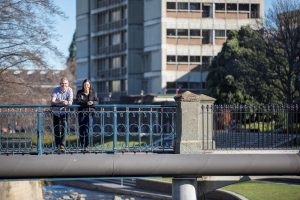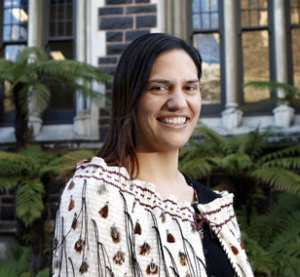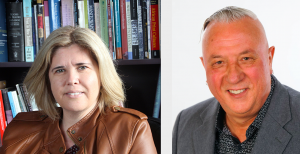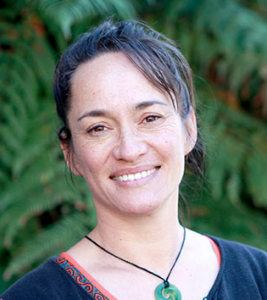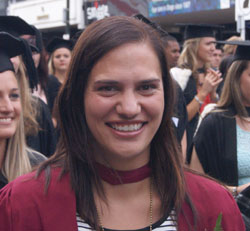Te Tumu input into international cancer research
Regular readers of this blog will know of Karyn Paringatai’s research work. Not only is she an award-winning teacher, an advanced te reo Māori practitioner, and kapa haka aficionado, but she is also undertaking Marsden-funded research on Māori and gastric cancer in collaboration with Professor Parry Guilford of the university’s Centre for Translation Cancer Research. What follows is an update of this research, and some media links for those wanting more information.
Hereditary diffuse gastric cancer (HDGC): updated clinical practice guidelines
Māori are three times more likely to develop stomach cancer than people of European descent. Māori are one of the few populations worldwide where diffuse-type gastric cancer is more common than intestinal-type stomach cancer. Diffuse gastric cancer is an aggresive type of cancer that grows rapidly in the cells of the stomach wall – it does not form a mass or a tumour. These cancer cells spread widely and quickly and it makes it difficult to diagnose. The reasons for this high occurrence of diffuse stomach cancer are unclear but a relatively high frequency of the inherited CDH1 variants in the Māori population is one important reason. When working properly the CDH1 gene controls the growth of cells. But because it has mutated it allows cells to grow uncontrollably – including cancer cells. This genetic mutation is particularly prevalent amongst Māori, but many are unaware of the risk.
When Dr Karyn Paringatai was tested for a CDH1 variant 11 years there were only 3-4 Māori whānau with mutations in this particular gene. That number has since increased to between 12-15 Māori whānau. This prompted researchers and health professionals working in this area and affected whānau and families from all around the world to gather in Wānaka in March 2019 to update the previous management guidelines for HDGC published in 2015. A number of important new and revised recommendations are made in these updated guidelines, which was recently published by Lancet Oncology. However, most pertinent to Māori was that the whānau of any Māori person who has been diagnosed with diffuse stomach cancer be encouraged to have a genetic test, regardless of any other family history. Previously, the guidelines were largely based around the number of cases of this cancer in a family. 11 years ago Karyn had to fight to be tested and prove that she was at risk of HDGC, which was tough to do with her scant knowledge of her whānau’s medical history. That is no longer the case.
Professor Parry Guilford (Te Aho Matatu, Centre for Translation Cancer Research, University of Otago), the lead author of the article, states, “It is very uncommon in international guidelines to single out sub populations, so this is quite a significant move that we hope will reduce their risk as well as helping to reduce inequities in health for Māori.” Karyn, a co-author of these guidelines, is actively encouraging Māori to be tested and to make contact with her for any advice on how to do so. It is important to do so – for the future of our whakapapa.
This research is linked to Karyn’s Marsden funded project E kore au e ngaro – The enduring legacy of whakapapa.
Click here for a link to the updated guidelines in Lancet Oncology
Click on the links in the titles below to access media reports.
| Three, Newshub Live at 6pm, 10/08/2020, Samantha Hayes and Mike McRoberts |
| There are likely to be several hundred Maori unaware they are at high risk of an inherited form of stomach cancer, a New Zealand research team has suggested. The team from the University of Otago is hopeful updated international clinical practice guidelines they helped develop will encourage these people to be tested. |
| Radio NZ – National, Checkpoint, 10/08/2020, Lisa Owen |
| Report by Meriana Johnsen. A move to make it easier to get tested for stomach cancer is expected to save the lives of whanau Maori, and in particular, the several hundred Maori who are unaware they are at risk. New guidelines developed by the University of Otago and Kimihauora Research Clinic allow Maori to be tested for the genetic mutation CDH1 even if there is only one other family member with stomach cancer. |
| Radio NZ – National, 15:00 News, 10/08/2020 | |||||||
| A new testing criterion for identifying stomach cancer developed by Otago University and the Kimihauora Research Clinic is anticipated to save the lives of whanau Maori. Otago University’s Senior Lecturer at the School of Maori, Pacific, and Indigenous Studies Karyn Paringatai says Maori would have fewer holes to jump through.
|
|||||||
| Stomach cancer test to save whanau Maori lives | |||||||
| Radio New Zealand, Other, 10/08/2020 | |||||||
| A move to make it easier to get tested for stomach cancer is expected to save the lives of whānau Māori, and in particular, the several hundred Māori who are unaware they are at risk. New guidelines developed by the University of Otago and Kimihauora Research Clinic allow Maori to be tested for the genetic mutation, CDH1, even if there is only one other family member with stomach cancer. |
| Testing expected to save Maori from stomach cancer |
| Radio New Zealand, Other, 10/08/2020 |
| A research team hopes Maori lives will be saved with a new testing criteria for stomach cancer. The University of Otago and Kimihauora Reseach Clinic have developed the new criteria to make it easier for Maori to be tested for the genetic mutation that leads to the cancer. |
| Changing international guidelines to save Maori lives |
| Radio New Zealand, Other, 10/08/2020 |
| Researchers have managed to get a change to international clinical guidelines to ensure Maori are tested for a gene which causes stomach cancer. Otago University Professor Parry Guilford explains to Jesse why this gene is more prevalent in Maori and can be identified before a person gets cancer. |
| New clinical guidelines for stomach cancer testing aim to improve outcomes for Maori |
| Newshub, Other, 10/08/2020, Dave Goosselink |
| An Otago University team has developed new clinical guidelines for testing stomach cancer in New Zealand – especially in Maori. Maori have a higher risk of developing the disease, due to a cancer-causing gene passed down through some whakapapa. |
| Research team hopes Maori lives will be saved with new testing criteria for stomach cancer |
| New Zealand Doctor Online, Other, 10/08/2020 |
| There are likely to be several hundred Maori unaware they are at high risk of an inherited form of stomach cancer and a New Zealand research team is hopeful updated international clinical practice guidelines they helped develop will encourage these people to be tested. The University of Otago and the Kimihauora Health and Research Clinic’s (Mt Maunganui) work in understanding the role of variants (mutations) in the CDH1 gene in familial stomach cancer and the subsequent development of a genetic test, has dramatically reduced the number of deaths from this form of inherited cancer. |
| A research team hopes Maori lives will be saved by new testing criteria for stomach cancer |
| NZCity, Other, 11/08/2020 |
| Otago University Professor Parry Guilford was part of the research team which in 1997, discovered a gene mutation that makes people more likely to get stomach cancer. He’s now helped develop a new set of testing guidelines for it. |
| Research team hopes Maori lives will be saved with new testing criteria for stomach cancer |
| University of Otago, Other, 10/08/2020, Liane Topham-Kindley |
| There are likely to be several hundred Maori unaware they are at high risk of an inherited form of stomach cancer and a New Zealand research team is hopeful updated international clinical practice guidelines they helped develop will encourage these people to be tested. The University of Otago and the Kimihauora Health and Research Clinic’s (Mt Maunganui) work in understanding the role of variants (mutations) in the I gene in familial stomach cancer and the subsequent development of a genetic test, has dramatically reduced the number of deaths from this form of inherited cancer. |
| Newstalk ZB (Auckland), 10:00 News, 11/08/2020 |
| Otago University Prof Parry Guilford has helped develop new testing guidelines for his 1997 research, with the hope that it will make it easier for Māori to get tests to find out if they have stomach cancer-causing genes. |
| Newstalk ZB (Auckland), 10:00 News, 11/08/2020 |
| Otago University Prof Parry Guilford has helped develop new testing guidelines for his 1997 research, with the hope that it will make it easier for Māori to get tests to find out if they have stomach cancer-causing genes. |
Te Tumu in this year’s Marsden Round
This has been a great year for research in Te Tumu. Every November Te Pūtea Rangahau a Marsden (Marsden Fund), run by the Royal Society Te Apārangi, announces its forthcoming research grants. Winning a grant is a two stage process, with applicants having to get past a preliminary round, then develop their applications for the second round; they have about a 10% chance of success in the Humanities and Social Sciences panels. There are six successful applications within the Division of Humanities, three of which have a Te Tumu connection.
Dr Karyn Paringatai‘s project “E kore au e ngaro! The enduring legacy of whakapapa” ($823,000, Social Sciences panel) looks at how the knowledge of whakapapa can impact on health, with particular reference to Māori affected by the CDH1 cancer-causing gene. Click here for more information. Professor Parry Guilford, Director of Otago’s Centre for Translational Cancer Research, is an associate investigator on the project.
Associate Professor Lachy Paterson is a principal investigator alongside Associate Professor Angela Wanhalla (History Department) on “Te Hau Kāinga: Histories and Legacies of the Māori Home Front, 1939-1945” ($746,000, Social Sciences panel), exploring the lived experiences of Māori who remained in New Zealand during the Second World War. Click here for more information. Although the project begins next year, one of our undergraduate students, Haeata Watson, has already started a project looking at Ngāti Kahungunu experiences, funded through a Ngā Pae o te Māramatanga Summer Internship.
Both Karyn and Lachy are based in Te Tumu’s Māori Studies programme, occasionally teaching into the Indigenous Development programme. Karyn also coordinates the Master of Indigenous Studies programme.
Professor Merata Kawharu, who until recently held an adjunct position within Te Tumu but is now based at the Centre for Sustainability, was also successful. Her project, “A question of identity: how connected are Māori youth to ancestral marae, and does it matter?” ($605,000, Humanities panel) will investigate the relationships that young Māori have with their marae. Click here to find out more. Merata with be working with associate investigators, Dr Stephen McTaggart (University of Auckland), former Dean of Te Tumu, Professor Paul Tapsell (now at the University of Melbourne) and Dr Krushil Watene (Massey University).
Special thanks to Marjoleine Righarts, Research and Enterprise’s Research Advisor for Humanities who helped immensely with all the applications.
“How whakapapa saved my life”
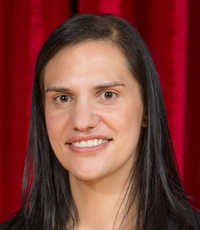 Dr Karyn Paringatai (Ngāti Porou) is perhaps best known for her innovative award-winning teaching pedagogy – teaching in the dark. But on 10 November, Karyn gave a talk for TEDxDunedin on a much more personal issue, on how learning her whakapapa saved her life. TEDx talks are about “Ideas Worth Spreading”.
Dr Karyn Paringatai (Ngāti Porou) is perhaps best known for her innovative award-winning teaching pedagogy – teaching in the dark. But on 10 November, Karyn gave a talk for TEDxDunedin on a much more personal issue, on how learning her whakapapa saved her life. TEDx talks are about “Ideas Worth Spreading”.
Click here to watch the video of Karyn’s talk.
Karyn teaches Māori language and performing arts in Te Tumu.
Dr Paringatai as keynote speaker at Tuia Te Ako hui
 Te Tumu lecturer, Dr Karyn Paringatai, will be giving a keynote address at the Tuia Te Ako hui to be held at at Te Kete Ika, Lincoln University, Lincoln, Canterbury, 8 -10 July 2015. This hui will bring together the diverse Māori tertiary whānau to discuss, debate and challenge current issues relating to Māori success in tertiary education. Karyn, who won the Prime Minister’s Supreme Teaching Award last year, will be talking about her innovative teaching methods of “teaching in the dark”.
Te Tumu lecturer, Dr Karyn Paringatai, will be giving a keynote address at the Tuia Te Ako hui to be held at at Te Kete Ika, Lincoln University, Lincoln, Canterbury, 8 -10 July 2015. This hui will bring together the diverse Māori tertiary whānau to discuss, debate and challenge current issues relating to Māori success in tertiary education. Karyn, who won the Prime Minister’s Supreme Teaching Award last year, will be talking about her innovative teaching methods of “teaching in the dark”.
Click here for biographies of the Keynote Speakers.
More recognition for Dr Karyn Paringatai
Te Tumu academic, Dr Karyn Paringatai, now has a role helping support Māori postgraduates across the university. Following on from the great work done by Anaru Eketone (of Sociology, Gender & Social Work), Karyn has been appointed as Māori Postgraduate Student Advisor, a part-time position at the University’s Graduate Research School. In many ways, this will be an extension of the work that Karyn has already been doing with Te Tumu postgraduates. Click here for the Otago Bulletin Board story.
Karyn’s role is supported by funding from Ngā Pae o te Māramatanga. She has just come back from leading a group of Otago postgraduates to Ngā Pae’s Māori and Indigenous Doctoral Conference held at Maketū Marae at Kāwhia where, I understand, everyone was blown away by our students’ presentations.
Dr Karyn Paringatai’s success celebrated.
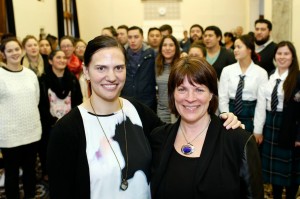
Te Tumu lecturer, Dr Karyn Paringatai and Professor Harlene Haynes, Vice Chancellor of the University of Otago.
On Monday night, the Vice-Chancellor celebrated Te Tumu staff member, Dr Karyn Paringatai’s success, with an event attended by many people from within the university, including Te Tumu staff and students. See the Otago Bulletin story here.
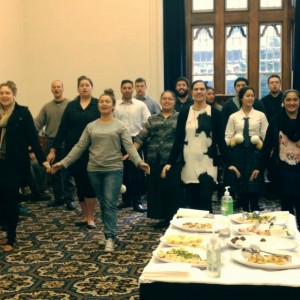
Indigenising the Academy – performing Ngoi Pewhairangi’s “Whakarongo” in the University of Otago’s Council Chambers to celebrate the success of Dr Karyn Paringatai.
Karyn won New Zealand’s top tertiary teaching award recently in Wellington, the Prime Minister’s Supreme Award for Tertiary Teaching Excellence, based on utilising the pre-contact Māori pedagogy of teaching in complete darkness, which has proved to be outstandingly successful in her performing arts paper, MAOR108 Waiata: Te Tīmatanga. Listen to the Radio NZ interview and Dunedin Television item in which Karyn explains her teaching practice.
Karyn has undertaken significant research to ensure that her teaching in the dark, and has just published on this ‘A Return to the “Dark Ages”’ in the journal Akoranga 10 (2014).
Just this week Karyn also employed the same methods in a guest lecture for the 900 students of MAOR102: Māori Society, showing that this pedagogy can be applied to more than just performing arts. She is planning to continue to use and develop “teaching in the dark” and publish more on this research.

